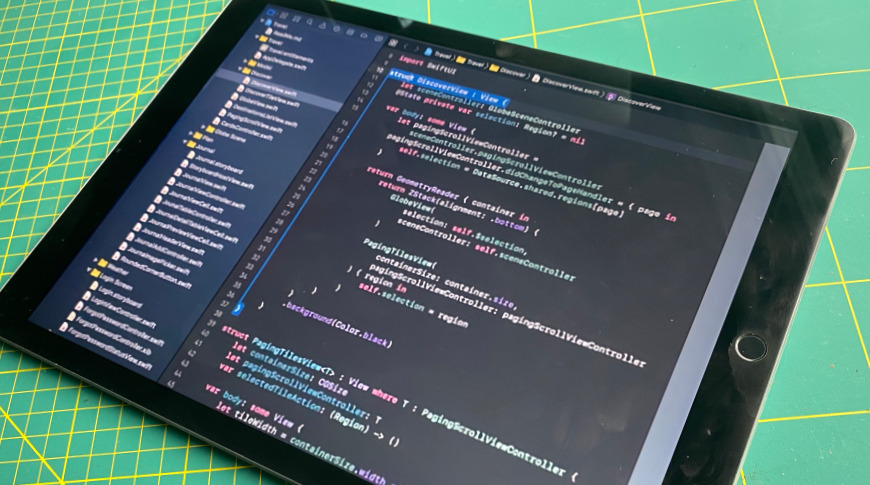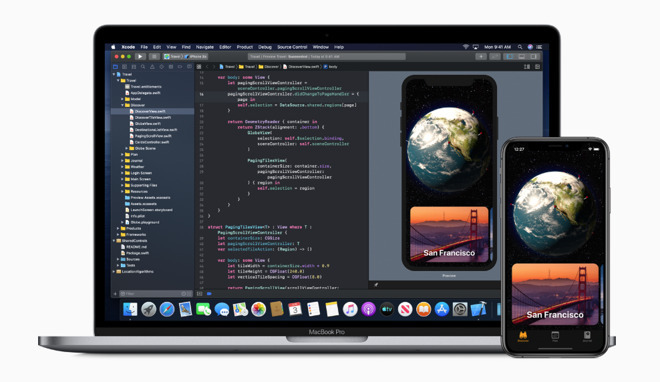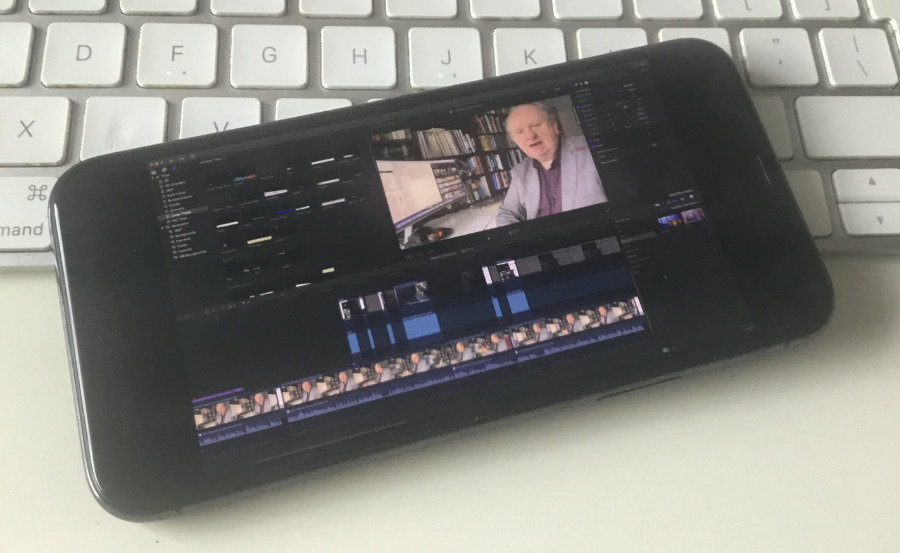Apple's pro applications, and more importantly its software development tools, are reportedly coming to iPadOS. AppleInsider talked to developers about how likely this is, and what they want — and need — to see.
Apart from the occasional reference to new features in iOS or iPadOS, most leaks about Apple are concerned with forthcoming hardware. Recently, though, successful leaker Jon Prosser has claimed that there is a huge change coming to software. Specifically, he says that Final Cut Pro X is coming to the iPad Pro, and that so is Apple's development software app, Xcode.
Even though Bloomberg writer Mark Gurman says it isn't true, Prosser is quite strident about this, ultimately claiming he knows details that he cannot reveal yet.
Maybe he's right that we'll get Xcode on the iPad, and maybe he's right that we'll get Final Cut Pro X. But he is unquestionably wrong that the two would be in any way related. Apple does not need to port Xcode to iPadOS in order to create any app there whatsoever.
Like any other Apple app — in fact, like any other app at all — Final Cut Pro X is written on Xcode on a Mac and that development software then builds the version that the company sells. Glossing over what turn out to be many detailed problems Apple would have to solve, in theory it would just build an iPad version the same way.
I'm not gonna say that Final Cut is coming to iPad...
— Jon Prosser (@jon_prosser) April 20, 2020
But XCode is present on iOS / iPad OS 14.
The implications there are HUGE.
Opens the door for "Pro" applications to come to iPad.
I mentioned this last week on a live stream, but figured it was worth the tweet
So we asked developers, both large and small, both US and globally, what they thought of FCPX coming to the iPad — and, more importantly, whether Xcode on iOS is coming.
Final Cut Pro X on the iPad?
"I could potentially see a connection from a marketing point of view," says Ken Case, CEO of the Omni Group, which makes OmniFocus, OmniOutliner, and more. "[As in advertising that the] iPad is ready to take on more pro work. But it's hard to see any connection from an engineering point of view."
Just as we do, Case knows that FCPX is currently built on a Mac, and would continue to be so even if there were an iPad version.
"Xcode for iPad wouldn't make that process any easier," continues Case. "In fact, it would probably make it a bit harder since it would be working with a whole new set of tooling that's hasn't yet shipped for production."
I am now 100% confident that FCPX, Logic Pro & Xcode are coming to iPad Pro.
— Jon Prosser (@jon_prosser) April 22, 2020
I cannot confidently say to what capacity, or with what limitations due to RAM management — but it's happening within the next year or so.
You can choose to trust me on that, or not, I suppose
Image editing company Pixelmator says that both will come, even if there's no real connection. "We feel Apple wants the iPad to be a pro device for serious work and it's becoming ever more powerful with each new device," says lead Pixelmator developer Simonas Bastys.
"Therefore, it's likely apps like Xcode and Final Cut Pro X will eventually come, if not now, then in the future," he continues.
The benefits and perils of Xcode on the iPad
"Whilst I'm excited about the prospect of Xcode for iPad, it's unclear how it would realistically build most existing projects," says ITV Hub developer Steve Barnegren from the UK. "Many developers augment Xcode's build process by inserting custom scripts in to the build process, or requiring some build steps to be performed on the command line before Xcode itself can build the project."
"On macOS, developers can leverage any command line tools installed on the system, and have unrestricted freedom to modify or generate files during the build," Barnegren continues. "Without some sort of access to a command line, and more complete file system access, it's difficult to envision how these types of workflows could continue to exist on iPad."
Barnegren wants to emphasise just how crucial these extra tools are.
"[They've] allowed the community to create many tools that could otherwise not exist," he says. "Popular tools include CocoaPods, Carthage and SwiftLint, which many projects rely on. Often these tools are built in languages that are outside of Apple's ecosystem, such as Ruby, and allow the community to create workflows and solutions that are not possible out of the box."
"If Xcode for iPad were to be a serious proposition for professional developers it would have to provide some support for these workflows," he concludes.
All the developers we spoke to had immediate and wide-ranging concerns about the practicality of Xcode being brought to the iPad.
"The main issue is with RAM usage," says Pixelmator's Bastys, "but there are solutions for certain things — they come with a performance cost, though."
"It seems unlikely to me that Xcode on iPad would have feature parity with the current Xcode running on Mac," says Case from the Omni Group. "For starters, while Xcode on Mac lets you develop both Mac and iPad software (and iPhone and Apple Watch and Apple TV and even command-line UNIX software), it seems unlikely that Xcode on an iPad would let you develop for all those target platforms."
"And there are a lot of portions of our Xcode development process that currently depend on a UNIX shell and UNIX tools being available— which iPad is certainly more than capable of handling," Case says. "Presumably it would need to do so in a much more sandboxed way than we're used to seeing on Mac. But even with those sorts of limitations, making it possible for the platform to develop its own apps would be a great step forward."
That was the other recurring point from every developer, that they all want it to happen. They all want to be able to develop directly on iPads instead of solely on the Mac.
Devices and desires
"I do daydream about being able to go on a trip and leave my Mac at home (while bringing my iPad), and theoretically this would get us closer to that dream," says Case.
"Ever since the 12-inch PowerBook and up to the discontinued MacBook I've loved the combination of having a small portable machine in addition to a big development machine," says Gernot Poetsch, Founder of nxtbgthng, an indie iOS company in Berlin. "The iPad can be this "small portable dev machine" of the 2020s, it just lacks Xcode."
Developers aren't counting on Xcode coming to the iPad, though, as Pixelmator's Bastys says they're obviously concentrating on the technology they have available now.
"It doesn't really have an effect on us," Bastys says, "as we know the current technical hurdles and have ideas about how to overcome them to create a great image editing experience on iPad with our tools and apps."
There is an argument, though, that not only will Xcode come to the iPad, but that it should have been there a long time ago.
"Though iPad is now a decade old, with powerful hardware and a much more mature operating system in iPadOS 13, it still isn't able to function as a truly independent platform: it's completely dependent on Mac for the creation of all its native apps," points out Case. "Imagine if the Mac platform still hadn't been able to build any of its own native apps in 1994, a decade after its own launch!"
In its first ten years, the Mac reached System 7 and Macs such as the Power Macintosh 8100, and the PowerBook Duo 280c. In its first ten years, the iPad has, if anything, grown further and faster.
"Over the past decade iPad hardware has been getting faster and faster while remaining very energy efficient," says Case. "If iPads were able to run Xcode, I could imagine building an efficient build server farm made out of iPads."
Xcode is surely coming to ARM Macs
The issues of RAM, extra UNIX tools, and being able to run cross-platform developer scripts, are significant, but presumably not insurmountable. One other thing that could point to Xcode coming, though, is how Apple is expected to release Macs based on ARM processors.
Assuming that's true, it's impossible that Apple wouldn't already have Xcode running on ARM — and Final Cut Pro X, too. Porting to the ARM processors in an iPad would need more work, but the size of that original conversion job can't be estimated, and it has surely been done already.
Perhaps that's why these rumors are leaking now, when details of Apple's plans for ARM Macs are as well.
Keep up with AppleInsider by downloading the AppleInsider app for iOS, and follow us on YouTube, Twitter @appleinsider and Facebook for live, late-breaking coverage. You can also check out our official Instagram account for exclusive photos.
 William Gallagher
William Gallagher









-m.jpg)






 Marko Zivkovic
Marko Zivkovic
 Mike Wuerthele
Mike Wuerthele
 Christine McKee
Christine McKee
 Amber Neely
Amber Neely
 Sponsored Content
Sponsored Content
 Wesley Hilliard
Wesley Hilliard











44 Comments
It’ll happen. The iPad Pro is 100% capable now to host real pro apps.
I want to know what happened to William's "C" keycap, looks like the C was ground off...
Xcode to the iPad will happen, but will be irrelevant to developers.
Xcode to the ARM Mac (on the other hand) needed to happen, this is just a step in that direction.
God, let this be true! Thats the ONLY reason I use my 2012 MBP now. If this happens, I would not have to purchase a new MBP. Bad for Apple, great for developers!